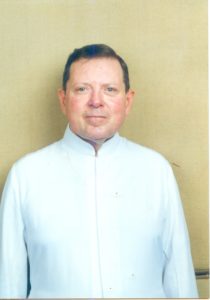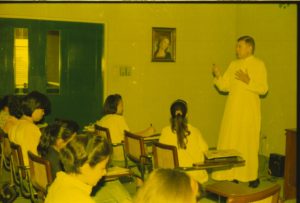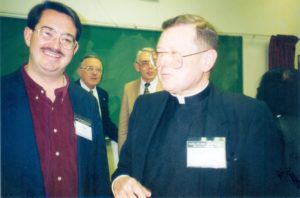On May 31, we commemorated the third death anniversary of Fr. Joseph M. de Torre, UA&P’s first University Professor of Social and Political Philosophy. He was born in Madrid on May 25, 1932 and in 1955 was ordained priest of the Prelature of Opus Dei. In 1968, he came to the Philippines, continuing his educational and pastoral work.
Below is an article published in the September 2008 issue of Universitas about this great priest, philosopher, author, and teacher.

“A social and political philosopher; author of books on social ethics, Catholic social teaching, modern philosophy and spirituality, family and bioethics;…member of the Carnegie Council for Ethics in International Affairs (the world’s leading voice promoting ethical leadership on issues of war, peace and global social justice)…and the Acton Institute for the Study of Religion and Liberty (ecumenical think-tank dedicated to the study of free-market economics informed by religious faith and moral absolutes).”
These are a few of the accomplishments cited in the encyclopedic entry under Fr. Joseph de Torre. There are others, most especially, awards, recognitions, and citations for his 22 books and hundreds of journal articles and research papers. These are the products of years of preaching as well as teaching in CRC/UA&P, where he started to teach in 1970.
Teaching in CRC/UA&P
Two years after coming to the Philippines (he arrived on June 21, 1968), Fr. De Torre joined the faculty of the Center for Research and Communication (CRC) as Professor of Social Economics and Social Ethics in the Industrial Economics Program and Economics Education Program. “Fr. De Torre has been a constant in CRC/UA&P since the school’s early years,” according to Fr. Roberto Latorre, a faculty member in the Department of Theology. “And he was involved at the outset of the orientation of the curriculum of School of Economics to Church doctrine, particular the social dimension. Through the years, he developed this expertise.”
In 1973, Fr. De Torre joined the Strategic Business Economics Program. In June 1989 when the CRC College of Arts and Sciences was inaugurated, he was appointed first Chaplain of the College and Chair of the Philosophy Department. When CRC became the University of Asia and the Pacific, he became University Professor Emeritus of Social and Political Philosophy and Senior Fellow.

Fr. Caesar Santos, Vice Director of the University Chaplaincy, says that UA&P has benefited tremendously from Fr. De Torre’s “profound knowledge of St. Thomas Aquinas’ theology and philosophy, the history of philosophy, and Church history, as well as his tireless efforts to communicate his knowledge of theology and philosophy through his years as a professor and as a writer of books on these subjects.”
Up to now, although Fr. De Torre no longer holds classes, Fr. Latorre believes that “he is always present, somehow laying the foundations to the extent that he could, with regards to the books available, bibliography, and courses.”
Prolific writer
Years of teaching the subject helped him produce his first book in 1975—Social Morals: The Church Speaks on Society. After that, he continued to write books, coming out with one almost every year. To date, he has written 22 books, the most recent of which is Being is Person: Personalism and Human Transcendence in Socio-Economic and Political Philosophy, which came out in 2005. Fr. Latorre believes that the University has attained recognition in the field of social ethics because of Fr. De Torre’s written works. “Fr. De Torre has given the University a high stature because of his many publications. I think that this is one of his great contributions to the school.”
His books have been widely read and cited by those in his field. In 1985, he received an award from the Catholic Mass Media for his book Christ and the Moral Life (the citation reads: “From its success in adequately capsulizing for the hard-pressed reader a subject of great magnitude and for its attempt to reeducate the Christian conscience in this age when new labels are readily given to old errors”). In February 1989 he received an award from the Asian Book Fair, Inc. as an “Outstanding Catholic Author.”
Fr. De Torre’s teaching and written works have led to his many highly regarded services to the Church in the Philippines. He was consultor to the late Cardinal Julio Rosales in the Pontifical Commission for the Revision of the Code of Canon Law, to the Papal Nuncio to the Philippines, Archbishop Bruno Torpigliani, and to Cardinal Jaime Sin, who appointed him delegate to the 1979 Synod of Manila, as expert in social ethics.
International congresses/societies
In the early 1990s, Fr. De Torre started to participate in international congresses of social scientists, during which he read his papers. These congresses are the annual conferences of the American Maritain Association, a not-for-profit-organization which is dedicated to understanding and building upon the philosophy of Jacques Maritain and the members of the realist tradition to which he belongs, and the Society of Catholic Social Scientists. The latter is a US-based organization of Catholic scholars, professors, and writers in the social sciences and related disciplines that seeks to promote scholarly endeavors toward helping rebuild the culture according to Catholic Church teachings, securing protection for the Christian family and all innocent human life, and furthering respect for the legitimate rights and duties of the human person.

He has also presented papers in the International Congress of Social Scientists and the International Society for the Study of European Ideas, which aims at promoting the study of Europe’s cultural past and present, particularly the creative aspects of the European mind in fields such as science, religion, philosophy, sociology, politics, history, and economics. His papers and other articles eventually came out in journals in Asia, the US, and Europe. At the same time, he contributed essays to books and encyclopedias on Catholic Social Thought. Today he is a member of international groups such as the Fellowship of Catholic Scholars (USA), the American Catholic Philosophical Association (USA), the Society of Catholic Social Scientists (USA), the American Maritain Association (USA), the Royal Institute of Philosophy (UK), the International Society for the Study of European Ideas (Haifa, Israel), and the Catholic Educators Resource Center (Canada).
Inspiration
Where does Fr. De Torre get inspiration for his work? He says,
“All my pastoral and teaching work has been inspired by the profound impact in my life of St. Josemaría Escrivá and Bishop Alvaro del Portillo, the Founder and the First Prelate of Opus Dei. As Jesús Urteaga says in his book Man The Saint: ‘Whatever good you may find in me, I owe it all to St. Josemaría. The rest is mine.’”
Fr. De Torre first became acquainted with St. Josemaría in the first half of 1950 through the book Camino written by the latter. “I was then in my junior year of College at the Instituto Nacional de Enseñanza Media Milá in Fontanals of Barcelona, a type of public state school covering all secondary studies leading to the bachelor’s degree ratified by a university.” Fr. De Torre eventually met him in person on November 11, 1952 when he was already a member of Opus Dei. From then on he would have many more memorable meetings and opportunities to work with him in Rome before and after his ordination in Madrid on August 7, 1955 as well as before and after his assignments in Ireland and the Philippines.

Fr. De Torre continues to be inspired by St. Josemaría as he reaches out to individuals, not in the classroom but through spiritual counseling, giving out highly sought-out advice on spiritual life.
In many ways, he, in turn, inspires those around him, especially the priests who have known him since he arrived in the country. Fr. Carlos Estrada, the University chaplain, says “Fr. De Torre is not only an accomplished philosopher, but also a dedicated priest. He combined study and writing with intense pastoral work.” Fr. Santos cites “his exemplary way of living the priesthood, the long hours he spends in the confessional and in imparting spiritual direction, his perseverance in living the spirit of Opus Dei all these years, his zeal in making people know about the life of St. Josemaría, whom he knew personally.”
To Fr. Latorre, “he is a very good example of one who gives of himself, first, in terms of the content of his work, and second, his presence of the spirit of Opus Dei, which is work. St. Josemaría used to say that we have to work ‘squeezed out like a lemon.’ His presence here is a bit like that. You see him squeeze himself like a lemon up to the very last energy he has, devoting it to productive activity.”#
Related articles:
Fr. Joseph M. de Torre: In Memoriam
Photo by Кристина Александрова from Pexels.
Leave a Reply